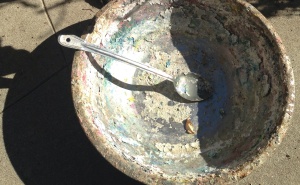
I never wash the play-dough bowl because I love the way it looks with history of past play-dough colors clinging to the sides like layers of rock. On occasion when people have come into the classroom to help, they have scraped and washed the bowl because they feel a clean bowl is a beautiful bowl. So..who is in charge of beauty in these classrooms? For sure we cannot achieve objective reality on that topic can we?
Reggio practice is a wonderfully holistic model that has flowed from theory, experience, practice and reflection. I love that it values collaboration, projects and natural light, and goes beyond children’s needs into children’s rights… and that conflict is embraced as a learning opportunity… that parents are welcome at school… and that teachers facilitate and guide learning… cuz… that’s how I roll.
I do have some things I wonder about.
I have had the opportunity to visit schools who claim to be Reggio Emilia in approach. Great attention is paid to an environment of “beauty”, and I sometimes think that there is confusion about who is the lover and judge of all this “beauty”.
I worry that for the most part it is the grownups who are ultimately in charge of all that because it is they who design the rooms, lay the pens out neatly and who arrange the bouquets and table settings for the children according to their own beauty and order constructs. In observing the children in these settings I have seen some wonderful stuff… but I have also seen some tightly controlled classrooms.
Yes..people work well in an orderly environment and can also tidy up when they are ready to stop for the day.
And…
If there is going to be hubbub and excitement it is important to know where the feathers are. Or where can I find red paint and brushes, or where the heck are the shovels, the hammers, the nails?
What do children find “beautiful” and how do we know?
Is the concept of beauty taught or implied culturally?
Is a mud-hole beautiful?
(Did you ever get sand in your teeth?)
Is the grime of exploration lovely? And how do you feel about scribble scrabble?
Or brown?
Or cut paper bits all over a table and spreading out onto the floor?
Or splashes and sploshes of paint on the floor and paint footprints leading to the sink?
Or gardens where every rock has been overturned because people were looking for creatures?
What do you mean when you state that there is no such thing as objective reality? Do you mean that each journey of discovery will be different and at diverse levels of understanding as we move forward and grow? I agree about that…
But objective reality exists.. though perceptions of it may differ.
For example; I am pretty sure the ice caps are melting and this is objective reality… and when I drop a rock it falls to the ground…
In any case, in the spirit of searching for school that can change the world..
Explore this: https://www.doortomyschool.com/school-profile



